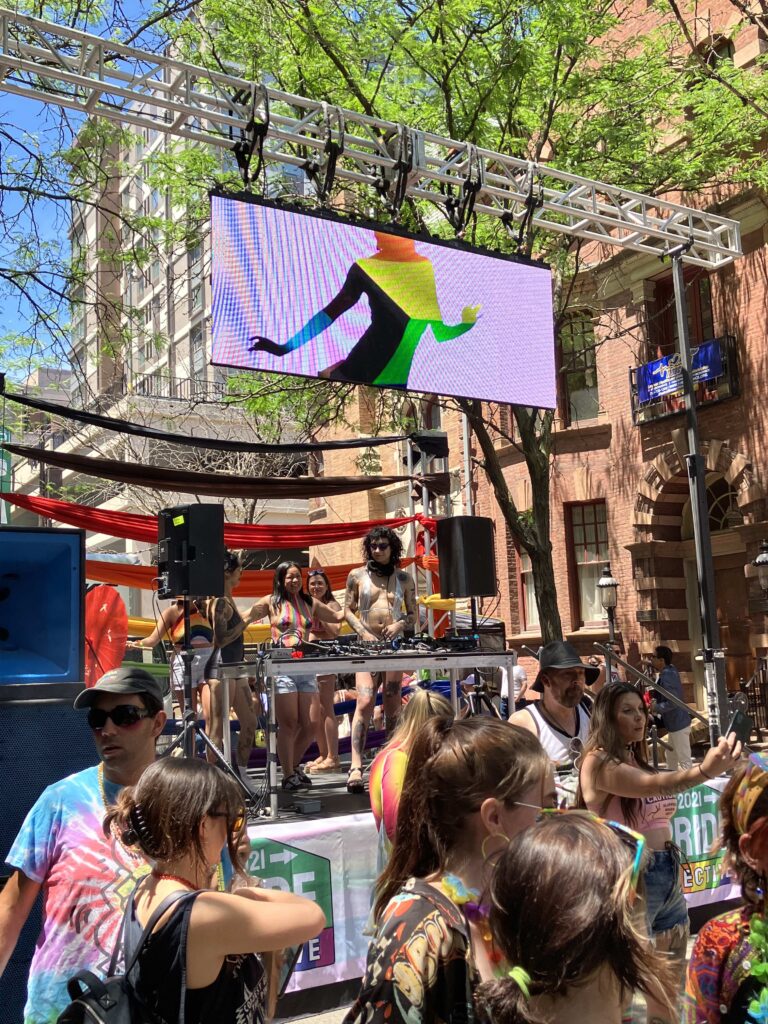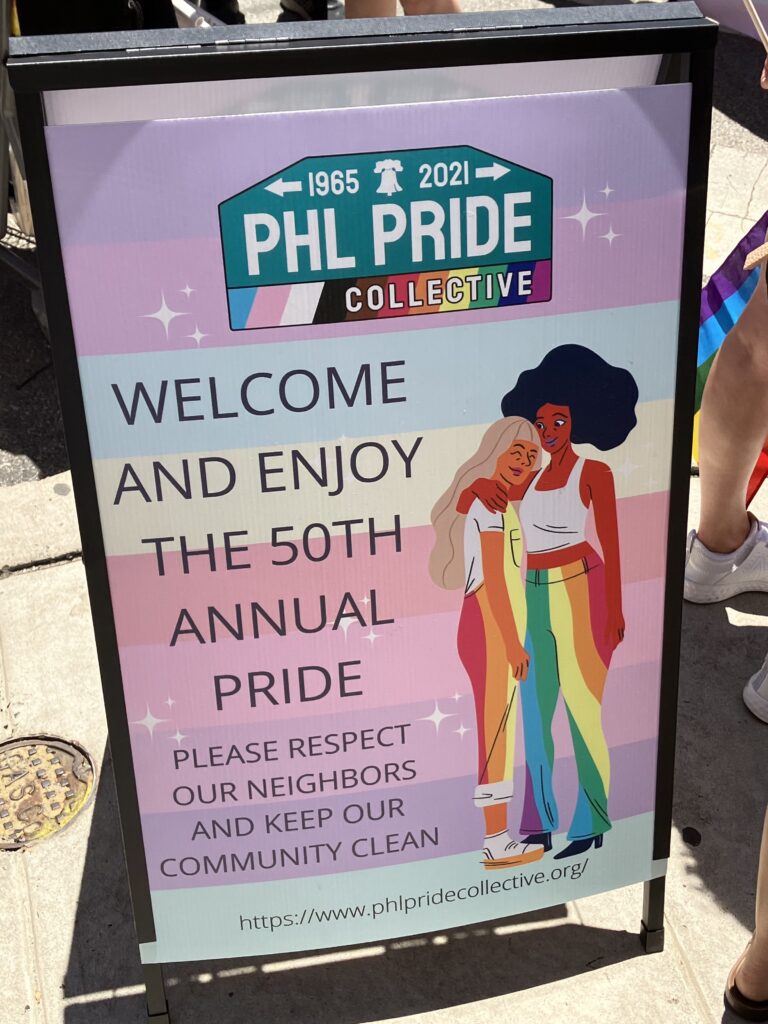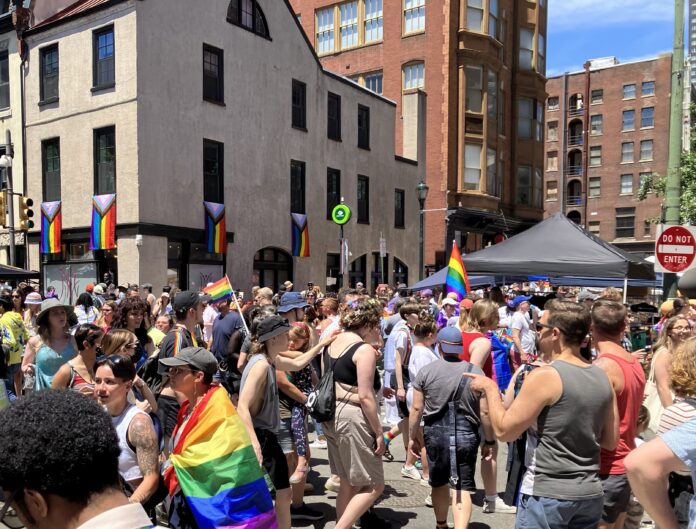If PHL Pride Collective’s (PPC) Pride march served as a counter to the continuous attacks against LGBTQ+ communities, the festival marked a different kind of defiance. For the 50th anniversary of Pride in Philadelphia, PPC created a festival that fostered a place of joy, celebration, education and empowerment, welcoming community members of all walks of life. PPC is a community program of the nonprofit organization galaei.
“We’re taking what the community knows and loves about Pride but expanding that,” said Nelson Torres-Gomez, prevention and education coordinator at galaei. “This is a moment to celebrate who we are, not to throw a party, to celebrate who we are. That chance should be given to everybody, whether you’re disabled, whether you’re a child, whether you’re 90, everyone deserves to love and accept and be proud of who they are.”
As a group, the collective decided to produce a Pride event in line with agreed upon points of unity, which include upholding the history of Pride, ensuring that Pride is about community and not big corporations, that Pride is accessible to disabled communities, that Pride is inclusive, and that Pride in Philadelphia is led by Black and Brown LGBTQ people.
“Being a part of this crowd and everything, it feels amazing, especially what’s been going on in the news and everything, a lot of things have been anti-gay and anti-trans,” attendee Raylin Norfleet said. “So to see so many of us out here makes [you] not lose hope. We can make a change because there’s a huge amount of us.”
PPC’s festival marked the first Pride for Cassandra Slover, who was there with her girlfriend.
“There is something almost sacred coming to a place like this, to show up and know that everyone is going to be accepting,” Slover said. “And also showing up for our trans brothers and sisters because there’s been so much hate in the media.”
Spanning roughly nine blocks of the Gayborhood, the festival offered sections for community-based organizations and LGBTQ-owned small businesses; a space for corporate businesses; two streets dedicated to youth and family spaces with amusements like moon bounces and street performers; chest feeding and diaper stations; Kiki Alley, which included performances by Lisa Lisa, Tina Montgomery, Luna Jawnette, Mia “The Body” Bombshell, Icon Ebony Fierce, VinChelle and more, emceed by Icon King Mother Jacen Supreme Moncler; a relaxation zone with tents, water, low key performances, accessible restrooms and a photo booth; a wheelchair charging station; a sober space with its own set of performances; a Muses stage with music by SWAY Philly and Boys of Summer; a youth performance stage; a resource station that included de-escalation support and therapy dogs; Spanish and ASL interpreters; and medical and therapeutic services; and food trucks. Staffers from Ingage Security could be seen inside the festival, while police officers were present around its perimeter.
“As a queer and trans person, this Pride feels a lot more inclusive than others I’ve been to, which feels really great,” said Jesse Brajuha, founder of Triton Soap, who was tabling at the festival. “As a queer and trans person, often I will feel not included in places like this. I’m not necessarily drawn to going to Prides anymore as an attendee, but as a vendor, it’s been really nice.”

Most of the sections of the festival drew healthy crowds, especially the Muses stage, which felt like its own dance club at one point; people were taking a load off in the relaxation zone; the lines for food trucks seemed to be constantly crowded (similar to past Pride celebrations), and families and youth were taking advantage of kid-friendly activities and resources. The Attic Youth Center hosted a Pride afterparty for youth 21 and under.
Mothasistah, who spoke at the march, was at the Meet the Authors tent in the family zone, with copies of her book “Life…according to Z,” about a young trans boy who comes out to his family.
“I’m glad to be here because it’s crucial, especially at this time,” Mothasistah told PGN. “While I am cisgender I know that my voice is needed because my son is transgender. We need to get on board and make sure our voice is heard and that [trans] rights are as important as mine. I extend my privilege and I’m kind of tired of just taking it for granted. My son still cannot come out. It’s not safe for him, he has been hurt repeatedly. That’s why my voice is louder than anyone else’s.”
Since PPC formed just last summer, not long after Philly Pride Presents dissolved, some community members had doubts about whether the collective would be able to actualize its plans for Pride, and some people complained about a lack of transparency. Yet others were staunchly confident in the collective’s organizational know-how and vision for its inaugural Pride events. Community members and leaders at the festival shared positive feedback.
“I think it’s important for us to be supportive of Pride, especially because we haven’t had it in the last couple of years,” said Zach Wilcha, executive director of Independence Business Alliance, who had a table at the festival. “I’m intrigued by and also energized by a model like this, that is a community, a cooperative, and one that is trying to center communities and pride that have not felt centered before.”
Representatives from Mazzoni Center hosted a table at the festival providing information and safe sex kits, and staff administered HIV and STI testing and free PrEP assessments at the organization’s Washington West location.
“I think it’s really awesome to see everybody coming out; everybody is so happy,” said Larry Benjamin, communications director at Mazzoni Center. “I hadn’t realized how hard it was to be away from community until I walked in today. Everybody’s really happy and supportive and it’s just great. It’s a nice [counter to] to all the hate we’re hearing and seeing.”

The PA Coalition for Trans Youth shared a table with the organizations TAKE and Lititz Chooses Love to raise awareness about the barrage of anti-trans legislation being passed in state governments.
“It’s so good that Pride is back on in Philadelphia; we’re having a lot of fun,” said Daye Pope, director of civic engagement for TAKE Resource Center. “We’re spreading the word because a lot of people haven’t been aware that they’re trying to pass anti-trans legislation in Pennsylvania like they have in Florida, Texas, Alabama and a bunch of other states.”
Leadership from Bebashi Transition to Hope provided a resource table at the festival, where they also invited attendees to answer a question about sexual health, spin a wheel and get a prize. “It feels great to be here,” said Michael Melvin, prevention education assistant supervisor at Bebashi. “We haven’t been here in two years, so we’re excited to be back out amongst people.”
The William Way LGBT Community Center opened its doors on Pride day, where staff provided restrooms, information and family-friendly games in the center’s lobby.
“This is such an exciting event, filled with energy, wonderful folks of all generations and communities, a beautiful day to celebrate the 50th anniversary of gay pride in Philadelphia,” William Way Executive Director Chris Bartlett said at the march.
Staff members from Prevention Point Philadelphia were at the festival providing narcan, narcan training, distributing condoms, resources about the organization’s programs, and information about injectable PrEP. “It feels great,” said Luis Couvertier, Prevention Point HIV/Hep C testing coordinator on the organization’s participation in the Pride festival. “I feel honored that [the collective] asked us to be part of Pride.”
Although Philly Black Pride President Le Thomas was unable to attend the festival, he said that photos of the day “reflected the idea of what a Pride Celebration should really look like.”
Community organizations with tables at the festival included Action Wellness, galaei, ACT UP, Temple Health, Reclaim, the American Federation for Suicide Prevention, the Jewish Philly LGBTQ Consortium, Queer Body of Christ, the Philadelphia Department of Public Health, Morris Home, and Liberty City LGBT Democratic Club.
“It just felt so, so good to be back in community in such a big way again,” said Adrienne Standley, organizer with ACT UP Philadelphia. “While COVID of course isn’t over, the past two years have been super isolating for many – physically and emotionally. We’ve been seeing lawmakers across the country and certainly in Pennsylvania ramping up attacks on trans folks, targeting especially trans youth, and basically trying to erase queer culture and existence through legislation. A reminder of how big and interconnected our community is, felt restorative. It’s incredible what the organizing committee was able to put together in limited time, and the intentionality that went into it. I’m just really grateful. And I’m so glad to be queer.”
LGBTQ-owned small businesses at the festival included Bird & Brush Art, Bondage-Robot, Naturally Queer, The Lion’s Den Candle Company, Triton Soap and Skin Care, Art of Smoke, and Hooks and Loops. Medical and therapeutic services were provided by organizations including Prevention Point Philadelphia, Action Wellness, Bebashi and Mazzoni Center. Food trucks at the festival included Masala Kitchen, The Little Sicilian Food Truck, Kandy Ices, and Grubaholics.
Youth activities were hosted collaboratively by The Attic Youth Center, Big Brothers Big Sisters Independence, galaei’s SPLAT program, William Way Community Center, Pennsylvania Youth Congress, Valley Youth House, and Philly Family Pride, who partnered with Prevention Meets Fashion and PFLAG to do a clothing swap and giveaway. Hey Mama Lactation and Perinatal Care and jkidPRIDE also provided services.

